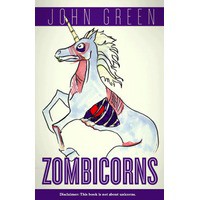6
Followers
6
Following
The Review Man
Formerly of Goodreads, now of both words, in the coming times only here?
Currently reading
Survival: A Thematic Guide to Canadian Literature
Lila: An Inquiry Into Morals
Simulacra and Simulation (The Body, In Theory: Histories of Cultural Materialism)
Leaven of Malice
The Salterton Trilogy
Effi Briest (Penguin Classics)
Empires of the Word: A Language History of the World
Cases And Materials On The Law Of Torts
Public Law : Cases Materials and Commentary
A Property Law Reader
Zombicorns (Zombicorns, #1)
 HERE BE SPOILERS
HERE BE SPOILERSZombie stories offer a great deal of conceptual freedom. The prospect of an actual zombie apocalypse is so unlikely that the author can get away with even more unlikely characters and subsequent plots. Whether that's a good thing is up to the reader, but at least there's a possibility of some original content.
John Green took advantage of these freedoms to create a fairly unique apocalyptic premise. While the Descartian philosophy was hardly fresh ground and the moral and ethical problems associated with killing a zombie have been addressed countless times, the zombie propagation method (i.e., corn) was intriguing. (It is incredibly misleading, however, to title a book "Zombicorns" and have no zombie unicorns in it. Especially given the book's cover.) It would also have been nice to see the story of the corn fleshed out… err, expanded; the story loses much of its realism without an explanation of how corn could possibly infect the entire world.
There are a few editing errors, but I guess that comes with the self-published-ebook-that-begins-with-an-author's-note-explaining-how-bad-the-novella-is territory (although saying that one's book will be bad doesn't give one an excuse to write a bad book). I also detected a whiff of Of Mice and Men in the story; it seems like Green tried to model interactions between Mia and Holly after Steinbeck's George-Lennie conflict. This doesn't really work. We never learn why Mia had no qualms killing her two parents but can't bring herself to shoot Holly. It's a romantic notion of innocence, but it's also quite inconsistent.
Overall, it wasn't a horrid book. Green can't resist being preachy (cf. Mia saying she was raised a secular humanist), which I find snooty and annoying, and a few of the footnotes aimed for DFW heights but (obviously) missed the mark. But I suppose it could have been worse.











